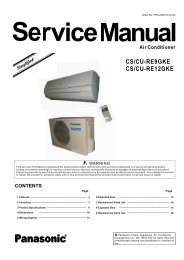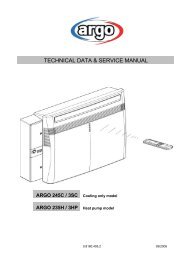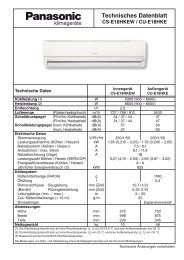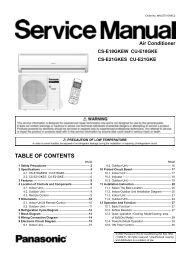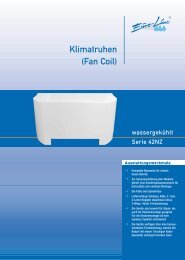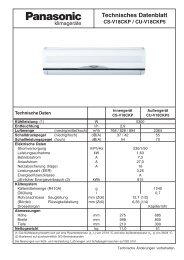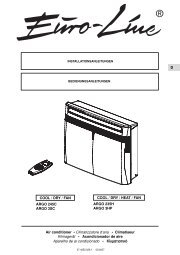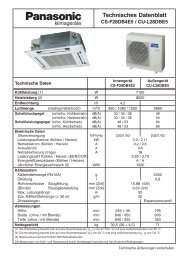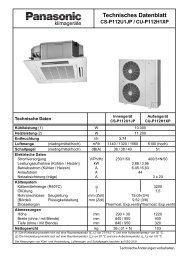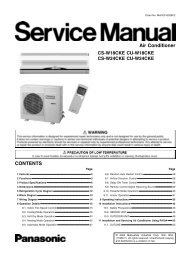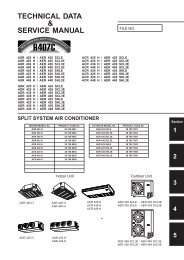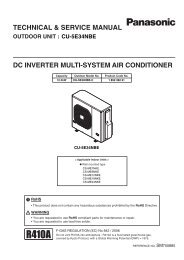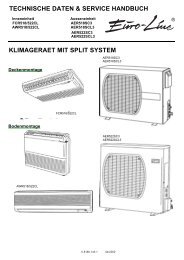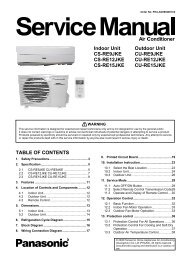technical & service manual split system air conditioner
technical & service manual split system air conditioner
technical & service manual split system air conditioner
Create successful ePaper yourself
Turn your PDF publications into a flip-book with our unique Google optimized e-Paper software.
(6) Recharging<br />
• Be sure to charge the specified amount of<br />
refrigerant in liquid state using the <strong>service</strong> port of<br />
wide tube <strong>service</strong> valve. The proper amount is listed<br />
on the unit's nameplate.<br />
When the entire amount cannot be charged all at<br />
once, charge gradually while operating the unit in<br />
Cooling Operation.<br />
● Never charge a large amount<br />
CAUTION of liquid refrigerant at once<br />
to the unit. This may cause<br />
damage to the compressor.<br />
• When charged with a refrigerant cylinder, use the<br />
electronic scale for charging refrigerant. In this case, if<br />
the volume of refrigerant in the cylinder becomes less<br />
than 20% of the fully-charged amount, the composition<br />
of the refrigerant starts to change. Thus, do not use<br />
the refrigerant if the amount in the refrigerant<br />
cylinder is less than 20%.<br />
Also, charge the minimum necessary amount to the<br />
cylinder before using it for charging the <strong>air</strong><br />
conditioning unit.<br />
Example:<br />
In case of charging refrigerant to a unit requiring<br />
0.76Kg using a capacity of 10Kg-cylinder, the<br />
minimum necessary amount for the cylinder is:<br />
0.76 + 10 x 0.20 = 2.76Kg<br />
For the remaining refrigerant, refer to the instructions<br />
of the refrigerant manufacturer.<br />
• If using a charging cylinder, transfer the specified<br />
amount of liquid refrigerant from the refrigerant<br />
cylinder to the charging cylinder.<br />
Prepare an evacuated charging cylinder beforehand.<br />
CAUTION<br />
● To prevent the composition<br />
of R407C from changing,<br />
never bleed the refrigerant<br />
gas into the atmosphere<br />
while transferring the<br />
refrigerant. (Fig. 6)<br />
Do not use the refrigerant if the amount in the<br />
charging cylinder is less than 20%.<br />
39<br />
Liquid<br />
Valve<br />
Single valve<br />
Charge the liquid refrigerant<br />
with the cylinder in the<br />
up-side-down position.<br />
Liquid<br />
Valve<br />
Fig. 4<br />
Single valve (with siphon tube)<br />
Charge with the cylinder in the Fig. 5<br />
normal position.<br />
Configurations and characteristics of cylinders<br />
Charging<br />
cylinder<br />
NO!<br />
Liquid<br />
Open Refrigerant<br />
cylinder<br />
Fig. 6



